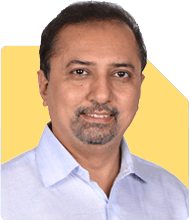Lost My Business Growth Post-Corona: Help an Odisha Real Estate Broker?
Pradeep Pramanik | Answer |Ask -Follow
Career And Placement Consultant - Answered on Aug 14, 2024
Pradeep, who hails from Bhagalpur in Bihar, has worked in the pharmaceutical industry for 15 years in sales, marketing, training and product management roles in companies like Lupin Pharmaceuticals, Elder Pharmaceuticals and Ranbaxy Laboratories.
During his tenure in the pharma industry, he has worked in different states including Bihar, Jharkhand, Andhra Pradesh, Telangana, Karnataka, Maharashtra, Tamil Nadu and West Bengal.
In 1998, he launched Fast Track Career Consultants with the aim of helping youngsters find jobs through the right career counselling, training and placement services.
They also offer HR analysis and appraisal services.
Over the years, he has been invited by management and engineering institutions to discuss education and employment policies, entrepreneurship, soft skills and emerging careers in India.
He has published four books on career counselling and contributed articles to print publications.... more

Respected sir I ve run a real estate broakerage agencies in Bbsr ,Odisha that deals with proposals selling of properties like Commercial lands,hotels etc.But there is no growth till now established in post corona,Sr what kind of guidance nd advice from u so that I will be reach that kind of individuals,(investor,property devloper,finacier) broakerage websites really help me.plz give me idea of that kind of proposals
You may like to see similar questions and answers below
Baqar Iftikhar Naqvi | Answer |Ask -Follow
Start-up Mentor - Answered on Sep 16, 2023
Chandu Nair | Answer |Ask -Follow
VC, Angel Investing, Entrepreneurship Expert - Answered on Feb 12, 2024
Baqar Iftikhar Naqvi | Answer |Ask -Follow
Start-up Mentor - Answered on Feb 29, 2024
Dr Ganesh Natarajan | Answer |Ask -Follow
Career Expert - Answered on May 28, 2025
Ramalingam Kalirajan |10908 Answers |Ask -Follow
Mutual Funds, Financial Planning Expert - Answered on Jul 10, 2025
Ramalingam Kalirajan |10908 Answers |Ask -Follow
Mutual Funds, Financial Planning Expert - Answered on Dec 20, 2025
Ramalingam Kalirajan |10908 Answers |Ask -Follow
Mutual Funds, Financial Planning Expert - Answered on Dec 20, 2025
Naveenn Kummar |237 Answers |Ask -Follow
Financial Planner, MF, Insurance Expert - Answered on Dec 20, 2025
Ramalingam Kalirajan |10908 Answers |Ask -Follow
Mutual Funds, Financial Planning Expert - Answered on Dec 19, 2025
Nayagam P P |10859 Answers |Ask -Follow
Career Counsellor - Answered on Dec 19, 2025
Ramalingam Kalirajan |10908 Answers |Ask -Follow
Mutual Funds, Financial Planning Expert - Answered on Dec 19, 2025
Ramalingam Kalirajan |10908 Answers |Ask -Follow
Mutual Funds, Financial Planning Expert - Answered on Dec 19, 2025
Ramalingam Kalirajan |10908 Answers |Ask -Follow
Mutual Funds, Financial Planning Expert - Answered on Dec 19, 2025
Radheshyam Zanwar |6751 Answers |Ask -Follow
MHT-CET, IIT-JEE, NEET-UG Expert - Answered on Dec 19, 2025
Radheshyam Zanwar |6751 Answers |Ask -Follow
MHT-CET, IIT-JEE, NEET-UG Expert - Answered on Dec 19, 2025
























